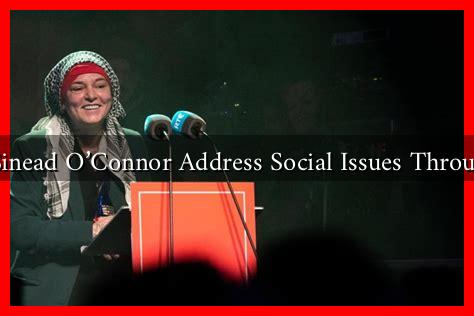-
Table of Contents
How Did Sinead O’Connor Address Social Issues Through Her Art
Sinead O’Connor, the Irish singer-songwriter known for her powerful voice and emotive performances, was not just a musical icon; she was also a passionate advocate for social issues. Throughout her career, O’Connor used her platform to address a variety of topics, including mental health, women’s rights, and the impact of institutional abuse. This article explores how O’Connor’s art served as a vehicle for social commentary and activism.
The Power of Music as a Medium for Change
Music has long been a powerful tool for social change, and O’Connor’s work exemplifies this. Her songs often reflect her personal experiences and broader societal issues, making her art relatable and impactful. Some key aspects of her approach include:
- Emotional Authenticity: O’Connor’s raw and emotional delivery resonated with listeners, allowing her to connect deeply with her audience.
- Provocative Lyrics: Many of her songs contain lyrics that challenge societal norms and provoke thought, encouraging listeners to reflect on pressing issues.
- Public Statements: Beyond her music, O’Connor was known for her outspoken views on various social issues, often using interviews and public appearances to amplify her message.
Addressing Mental Health
One of the most significant social issues O’Connor addressed was mental health.
. Throughout her career, she was open about her struggles with mental illness, which helped destigmatize the conversation around this topic. In her 2021 interview with The Guardian, she discussed her battles with depression and the impact it had on her life and career.
O’Connor’s song “Nothing Compares 2 U” is often interpreted as a reflection of heartbreak and loss, but it also serves as a metaphor for the isolation that can accompany mental health struggles. By sharing her experiences through her music, she encouraged others to seek help and speak openly about their own challenges.
Women’s Rights and Feminism
O’Connor was a fierce advocate for women’s rights, using her platform to highlight issues such as reproductive rights and gender equality. Her iconic performance on “Saturday Night Live” in 1992, where she tore up a photo of Pope John Paul II, was a bold statement against the Catholic Church’s stance on women’s issues, particularly in relation to reproductive rights.
In her song “The Emperor’s New Clothes,” O’Connor critiques societal expectations placed on women, emphasizing the importance of self-identity and autonomy. This track, along with others, showcases her commitment to feminist ideals and her desire to empower women to challenge oppressive structures.
Institutional Abuse and the Catholic Church
O’Connor’s relationship with the Catholic Church was complex, shaped by her own experiences of abuse within the institution. She was vocal about the Church’s role in perpetuating cycles of abuse, particularly against women and children. Her song “Fire on Babylon” addresses themes of betrayal and the need for accountability.
In 2013, O’Connor wrote an open letter to Pope Francis, urging him to take action against the abuse scandal that had plagued the Church for decades. This letter exemplified her commitment to justice and her willingness to confront powerful institutions.
Legacy and Impact
Sinead O’Connor’s contributions to social issues through her art have left a lasting impact. Her willingness to speak out on difficult topics has inspired countless individuals to engage in conversations about mental health, women’s rights, and institutional abuse. Some key takeaways from her legacy include:
- Breaking Taboos: O’Connor’s openness about her struggles helped break the stigma surrounding mental health.
- Empowerment Through Art: Her music continues to empower listeners to challenge societal norms and advocate for change.
- Advocacy for Justice: O’Connor’s activism serves as a reminder of the importance of holding institutions accountable for their actions.
Conclusion
Sinead O’Connor’s art transcended music; it became a powerful medium for addressing social issues that resonate with many. Through her emotional authenticity, provocative lyrics, and public advocacy, she tackled topics such as mental health, women’s rights, and institutional abuse. O’Connor’s legacy serves as a testament to the power of art in fostering social change and encouraging individuals to speak out against injustice. As we reflect on her contributions, it is clear that her voice will continue to inspire future generations to advocate for a more just and equitable world.





